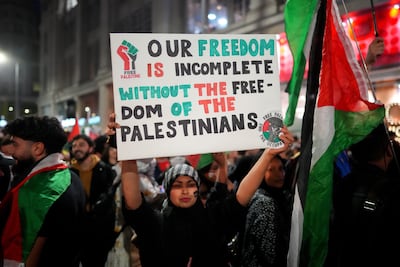Live updates: Follow the latest news on Israel-Palestine
Solidarity protests for Israel and Palestine were held in London on Monday, in a sign of the conflict’s far-reaching divisions.
Just three miles apart, hundreds of supporters of both sides of the conflict gathered.
Outside 10 Downing Street, the Prime Minister’s residence, a vigil for Israel brought together more than 2,000 Israeli expatriates and British Jews.
Meanwhile, hundreds of pro-Palestinian protesters gathered outside the Israeli embassy in Kensington, where they chanted, let off fireworks and lit flares. Some scuffles broke out.
Police said they made three arrests for an assault on an emergency worker, racially-motivated criminal damage and possession of an offensive weapon.
Nearby, officers were also forced to separate pro-Israel and pro-Palestinian groups at High Street Kensington tube station.
On Tuesday morning, Foreign Secretary James Cleverly called on supporters of Palestine to stay at home.
He said: “There is no need, there’s no necessity for people to come out. It causes distress.
“This is a difficult, delicate situation.”
UK ministers and leading members of the community spoke to the Downing Street vigil.
Tom Tugendhat, the Minister of Security, reaffirmed the UKs support for Israel.
“I spoke to the Prime Minister [Rishi Sunak] today and his commitment has only doubled,” Mr Tugendhat said.
Chief Rabbi Ephraim Mirvis opened the vigil by highlighting the importance of Israel for British Jews.
“Oh people of Israel we are at one with you, you are our destiny," he said. "We cry with you, we are at pain with you, and together with you we are for peace."
Tzipi Hotovely, Israel’s Ambassador to the UK, thanked the “people of London” who had come to express support for Israel, and condemned Hamas’s “barbaric” behaviour.
“We will never let them win," Ms Hotovely said. "To all the people that support the free world, that support democracy and support Jewish life in the Jewish state of Israel, we want to thank you."
Israel’s struggle was likened to the British fight against “intolerance and Nazism” in the Second World War by Iain Duncan Smith, a former leader of the Conservative Party.
“When we see a country like Israel suffering in the way that they have, through intolerance, violence, anger and desperation, we say very simply we are all Jewish, we are all Israeli."

Many held home-made posters with the names of those killed or still missing after the attack.
Emmie Seknadje, 24, a recent graduate, said that although she has always lived in London, she came to support Israel.
“My grandparents live in Israel and I have lots of extended family there," Ms Seknadje said. "Most people are not in their houses, schools are closed – it's wartime conditions."
There were also Iranians who came to denounce Iran's Islamic Revolutionary Guard Corps' involvement in the conflict as a sponsor of Hamas.
“The situation that took place in Israel is another human rights violation at the hands of the Islamic Republic of Iran,” said Ella Hijahiri, a British-Iranian women’s rights activist who has been involved in protests against the Iranian government.

“I’m here to let the world know that Iranian citizens are not in favour of any war. Whether it’s Gazans shooting at civilian Israelis, or Israel retaliating disproportionately.
“We need to face Hamas and do something about them, and cut the hands and the tentacles of the IRGC.”
The UK government and opposition have expressed unwavering support for Israel after the attack, with the Houses of Parliament and other landmarks being lit white and blue – the colours of the Israeli flag – at night.
Yet the Israeli-Gaza conflict is sowing deep divisions across London’s streets and university campuses.
Videos of people appearing to celebrate Hamas’s attack on Israel prompted Home Secretary Suella Braverman to call for police to “use the full force of the law” against such displays of support on Sunday.

Sam Verebes, 22, echoed these concerns when he attended the vigil.
“Public figures should be very careful about the language they use and the stories they portray," Mr Verebes said
"The safety of Jewish people is a considerable [concern]. On social media people are not informed and threaten Jewish people."
Across town, outside the Israeli embassy, a different crowd had gathered to protest against Israel’s war on Gaza, the occupation and illegal settlements.
There, Israel was described as an “apartheid” state, echoing condemnations of the country’s policies by human rights groups.
Mahmoud Abu Shakra, a maths teacher at a London school, sold Palestine-themed merchandise to raise funds for Palestinian refugees in Lebanon.
“They are excluded from a lot of jobs, they're discriminated against and marginalised,” Mr Abu Shakra said, adding that his family had been refugees in Lebanon.
He dismissed the UK's support for Israel and its response to the conflict as a “knee-jerk” reaction.
“If they were really worried about democratic values, they would respect human rights and freedom of movement,” he said.

Solidarity protests for Palestine often bring together an eclectic crowd, which today included Women of Colour in Global Women’s Strike, and the International Jewish Anti-Zionist Network.
Placards by the Socialist Worker Party, a long-standing staple at these protests, called for a Palestinian Intifada.
Haya, an Egyptian international relations student, said she was there to support the “liberation” of Palestine.
“We will not stop protesting, going out into the streets," Haya said. "We will always make sure that we educate and inform people of Israel’s crimes.
“We don’t want any more ethnic cleansing for the Palestinians. We want them to live in peace."

